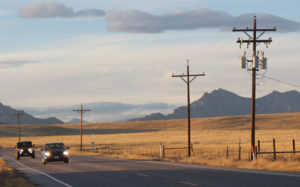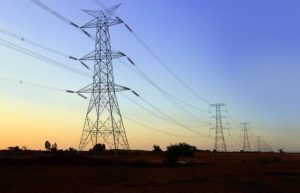EL PASO COUNTY–Mountain View Electric Association (MVEA), which serves 53,000 members in a 5000 square mile area in parts of eight counties filed a lawsuit against El Paso County (EPC) on March 18.
MVEA claims that county planning staff is trying to redefine different types of power lines to gain more space along county roads for widening at MVEA’s expense.
MVEA says that the attempt to “redefine MVEA’s distribution lines” will force them to move many lower-voltage lines along county roads.

In a press release issued Monday, Jim Herron, CEO of MVEA said, “Mountain View Electric believes that El Paso County’s interpretation of the Land Development Code grossly oversteps its authority provided in state statute to regulate utilities.”
The dispute over EPC’s authority to regulate power company infrastructure has been simmering since the state legislature passed a bill in 1974 allowing local governments a measure of control over “areas and activities of state interest.” The law has been referred to as “1041 powers,” referencing the original bill, HB74-1041, now codified as C.R.S. 24-65.1-101.
The law was a response to complaints by cities and counties that state government was running roughshod over local communities and ignoring their concerns about statewide projects including things like powerlines and pipelines.
But the authority granted by the law is not complete. The law specifies just ten “activities of state interest” and 4 “areas of state interest” local authorities are permitted to regulate. The activity here is the siting and construction of “major facilities of a public utility.”
The dispute is over the interpretation of the term “major facilities,” which defines what the county has authority to regulate.
The county claims it has regulatory power over all electrical power lines. MVEA claims that it can only regulate “major facilities,” which according to industry standards includes high-voltage “transmission lines” operating at 115,000 volts or higher that only run between substations, not “distribution” lines operating at less than 50,000 volts that run from substations to homes and businesses.

MVEA says in its court filing that the county has long refused to take a consistent position on its 1041 powers and says that the county has no authority to regulate distribution lines.
An examination of the County’s Resolution of May 26, 2015 amending its 1041 powers suggests that MVEA is correct. The Resolution says, “No electric transmission line…shall be constructed…within 105 feet of the centerline…except…electric transmission, distribution, and service lines less than 115 kilovolts.”
In most counties, powerline easements along highways are typically 20 feet or so outside the public highway right of way. MVEA purchased many of their easements from private property owners.
Usually, if a road needs to be widened and utilities have to be moved, the expense of both moving the lines and acquiring a new easement to replace the ones taken for road widening is on the county.
But in 2017, EPC land development officials informed MVEA that the county was now claiming that all electric lines of any voltage fall under the county’s 1041 powers.
If true, EPC can require all electric companies to move distribution lines 105 feet from the centerline of designated arterials or expressways and 45 feet from the centerline of current or proposed collector streets.
This could not only force the lines to be moved at MVEA’s expense when existing lines are upgraded, it would force MVEA to purchase new utility easements while also being forced to abandon their existing ones.
All of the expenses would fall on MVEA members, says Herron, many of whom don’t live in El Paso County.
Worse, Herron says in some cases the new lines would have to run over existing houses.
MVEA is requesting a judgment from the court that EPC’s interpretation of its 1041 powers is “unlawful” and a judgment in their favor “will end the uncertainty, insecurity and controversy” over the issue.
Alternatively, MVEA is asking the court to declare that EPC has seized MVEA’s vested property rights and it is owed just compensation under the 5th Amendment’s Taking Clause and Article II, Section 15 of Colorado’s Constitution.


